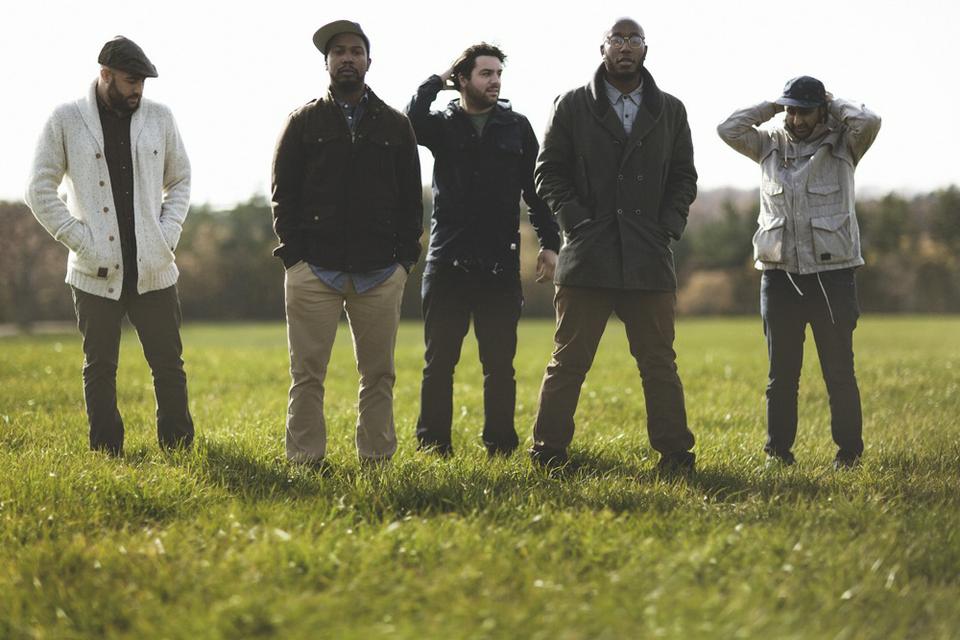
News
Summers Will Not Finish Semester of Teaching as Harvard Investigates Epstein Ties

News
Harvard College Students Report Favoring Divestment from Israel in HUA Survey

News
‘He Should Resign’: Harvard Undergrads Take Hard Line Against Summers Over Epstein Scandal

News
Harvard To Launch New Investigation Into Epstein’s Ties to Summers, Other University Affiliates

News
Harvard Students To Vote on Divestment From Israel in Inaugural HUA Election Survey
Beat of the Bay: Bad Rabbits
A feature that looks into the lives of up-and-coming Boston musicians

Not many bands can claim they’ve played with a metalcore group, opened for a pop diva superstar, and backed a legendary rapper, all in the span of a few years. But Boston funk-metal-pop-punk-R&B band Bad Rabbits has ties to Ke$ha, Slick Rick, and Every Time I Die, and the group is perfectly happy with living way outside the box. “We don’t have a musical lane that we live in,” says guitarist Salim Akram. “We can play with the Wu-Tang Clan, and we can play on Warped Tour.”
Bad Rabbits, composed of Akram, singer Fredua “Dua” Boakye, drummer Sheel Davé, guitarist Santiago “Santi” Aruajo, and bassist Graham Masser, formed in 2007 while its members were playing in the 10-person band The Eclectic Collective. Since releasing their breakthrough EP “Stick Up Kids” in 2009, the group has built a significant following among fans of wildly different musical genres.
“People have told us we’re basically the go-to band for hardcore kids’ parties,” says Masser. Davé agrees, adding: “Metal bands tell us they play us in their vans, and we play metal in our vans…. It’s like, don’t shit where you eat. The type of music you play shouldn’t be the type of music you listen to.”
I meet Bad Rabbits at their rehearsal space on the second floor of the labyrinthine Brighton Sound Museum. After an hour waiting for them sitting among old, half-empty bottles of Busch Light and listening to what sounds like sitar thrash metal emanating out of a nearby room, I get a text from Akram: “Sorry, running a little behind.”
A little while later, Davé and Masser appear and unlock the band’s cramped rehearsal space. While we’re waiting for the rest of the band to show up, I talk to the two about the band’s upcoming releases. Bad Rabbits recently recorded two albums, one, “American Dream,” with New Jack Swing pioneer Teddy Riley, and another, “American Love,” with Bay Area producer Brad Lewis. “Love” is set to drop sometime in spring 2013; the band isn’t sure when “Dream” will be released. “They’re definitely different albums,” says Davé. “The Teddy Riley album sounds like a big R&B album, but the Brad Lewis is a futuristic funk, post-R&B rock album.”
Davé’s description may sound a little ridiculous, but that’s what it takes to do justice to Bad Rabbits’ sound. Boakye’s loud, soulful, and suggestive falsetto bears comparison to Prince and Abel Tesfaye a.k.a. The Weeknd, and he is backed by stomping, danceable punk-funk. Boakye partly attributes this unlikely combination to his musical upbringing.
“I grew up in the Pentecostal church and my mom made me sing in the choir. I guess that’s how I developed my vocal styling—the power and screaming came from gospel. Sly Stone was also a major influence. I heard ‘If You Want Me to Stay’ when I was 12 and always wanted to sing like him. After joining bands in high school, that’s where I got some of the punk influence. I stumbled upon hardcore punk band Bad Brains around that time and decided I wanted to be in a band like that,” Boakye recounts.
Once all the band members are there, they sit around and talk about details for their upcoming tour, but the discussion quickly moves into unrelated territory; topis covered include Honey Boo Boo, the attractiveness of Ice-T’s wife, and the band members’ first albums, which range from Green Day to Bone Thugs-n-Harmony to Radiohead.
After an hour of talking, the band starts rehearsing for their upcoming national tour with rapper P.O.S. by powering through upcoming single “We Can Roll,” a metal-influenced fist-pumper laced with Boakye’s pitch-perfect falsetto. While Bad Rabbits have an electric stage presence at their live shows, this rehearsal is laid-back and more focused on getting the sound right. Boakye even nonchalantly checks his iPhone while singing the chorus of “Booties.”
It quickly becomes evident that the band’s punk influence comes through even more on their live performances than on their studio releases. When asked about this stylistic adjustment, Masser nods his head.
“When we play live, we incorporate a lot more of the rock aesthetic. Sometimes it turns into a hardcore show. We’ll play songs from ‘Stick Up Kids,’ and people will start moshing to it.”
With this liberal attitude toward genre welding, Bad Rabbits encapsulate several musical themes of the 21st century. People across the world now have instant access to an unthinkable amount of music, and iTunes collections mean that dozens of genres can sit side by side. It isn’t too surprising, then, that a band like Bad Rabbits would come along and combine all of them.
Want to keep up with breaking news? Subscribe to our email newsletter.
